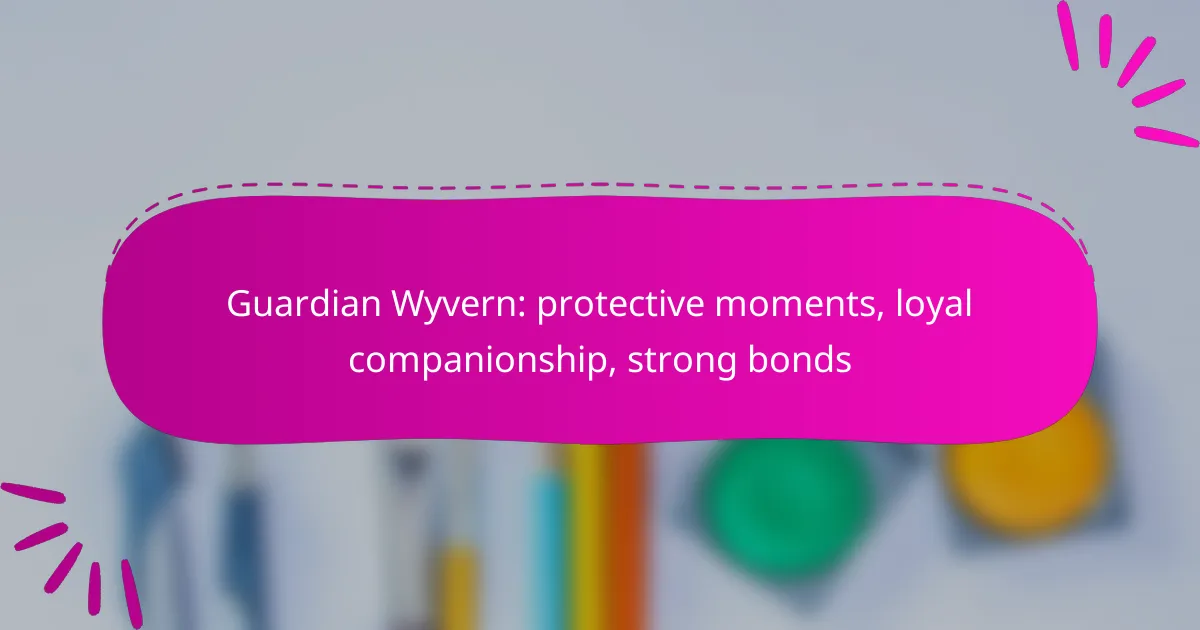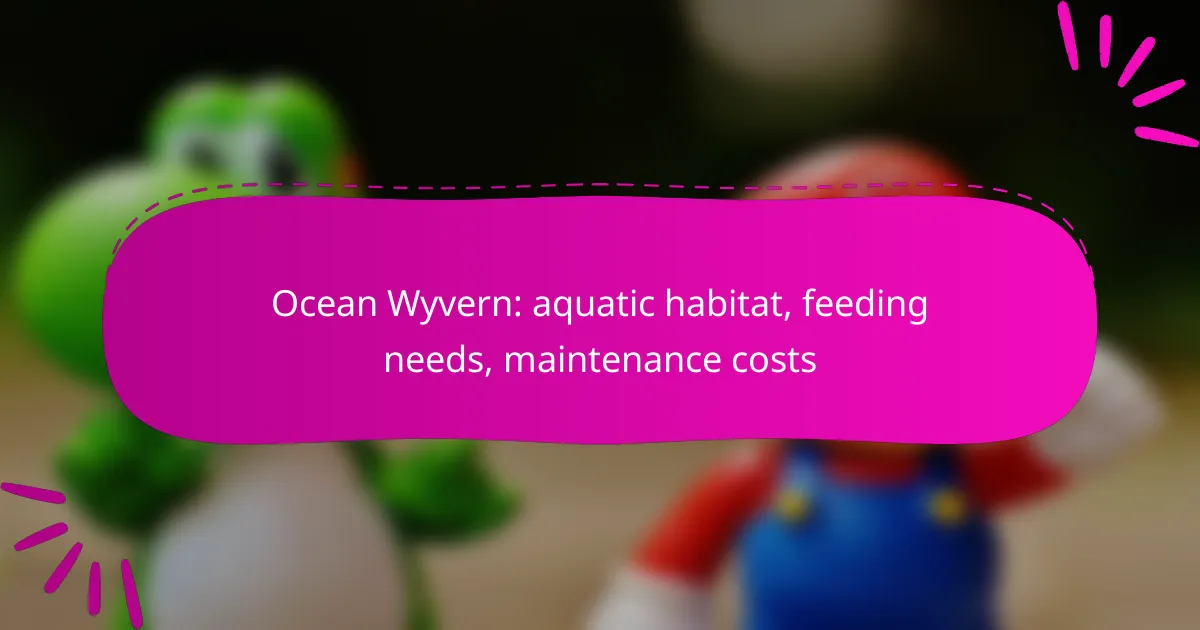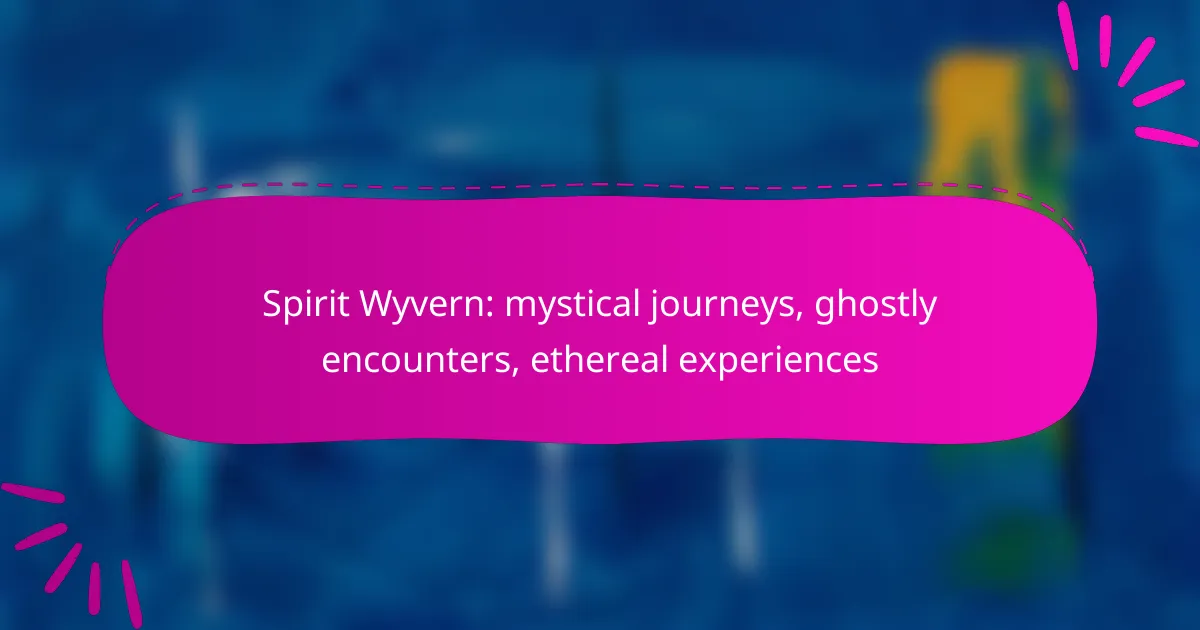Guardian Wyverns are remarkable creatures known for their protective instincts and unwavering loyalty. They possess an innate ability to sense danger, allowing them to act as both guardians and devoted companions. Through consistent interaction and shared experiences, these majestic beings form strong emotional bonds with their owners, enhancing their role as loyal protectors.
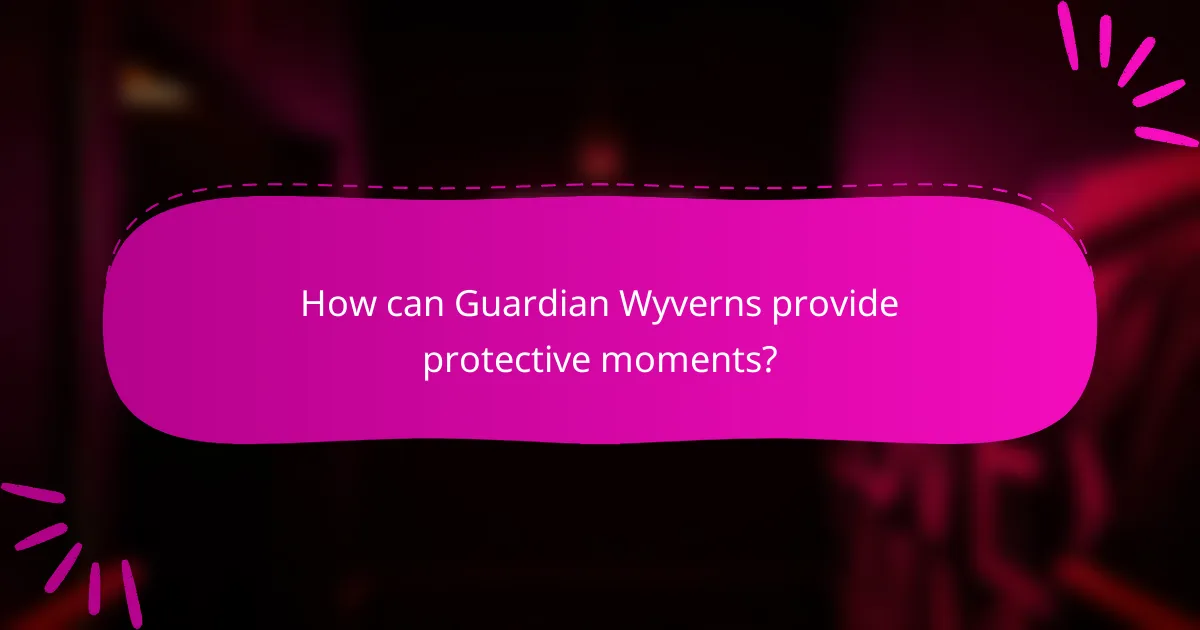
How can Guardian Wyverns provide protective moments?
Guardian Wyverns offer protective moments through their innate abilities to sense danger and respond effectively. Their loyalty and training enable them to act as both guardians and companions, ensuring safety in various situations.
Enhanced security features
Guardian Wyverns possess advanced sensory capabilities that allow them to detect threats before they become apparent to humans. Their keen eyesight and acute hearing can pick up on unusual sounds or movements, providing early warnings. This proactive approach enhances security for their companions.
Additionally, many Guardian Wyverns are trained to recognize specific danger signals, such as aggressive behavior from intruders. This training allows them to react appropriately, whether by alerting their human or taking defensive action.
Emotional support during crises
During crises, Guardian Wyverns provide significant emotional support, helping to alleviate stress and anxiety. Their presence can be calming, offering companionship that reassures individuals facing challenging situations. This bond can be particularly beneficial in high-stress environments.
Moreover, the loyalty of a Guardian Wyvern fosters a sense of security, allowing individuals to feel protected and supported. This emotional connection can be crucial for mental well-being during difficult times.
Physical defense capabilities
Guardian Wyverns are not only companions but also formidable protectors. Their physical strength and agility enable them to defend their human counterparts effectively. In situations where physical confrontation is necessary, they can deter threats through their size and capabilities.
Some Guardian Wyverns are trained to engage in defensive maneuvers, such as blocking paths or using their wings to create barriers. This physical defense can be a critical factor in ensuring safety during unexpected encounters.
Training for protective behavior
Training is essential for Guardian Wyverns to develop protective behaviors. This training often includes socialization with humans and exposure to various environments, helping them learn how to respond to different situations. Consistent reinforcement of positive behaviors is key to effective training.
Handlers should focus on teaching commands that enhance the wyvern’s protective instincts, such as “stay close” or “guard.” Regular practice and positive reinforcement can strengthen these behaviors, ensuring the wyvern is prepared to act when needed.
Real-life stories of protection
Numerous accounts highlight the protective moments provided by Guardian Wyverns. For instance, there are stories of wyverns alerting their owners to potential intruders, allowing them to take precautionary measures. Such instances demonstrate the effectiveness of their protective instincts.
Another example includes a Guardian Wyvern that intervened during a natural disaster, guiding its owner to safety when danger was imminent. These real-life stories underscore the invaluable role that Guardian Wyverns play in ensuring the safety and well-being of their companions.
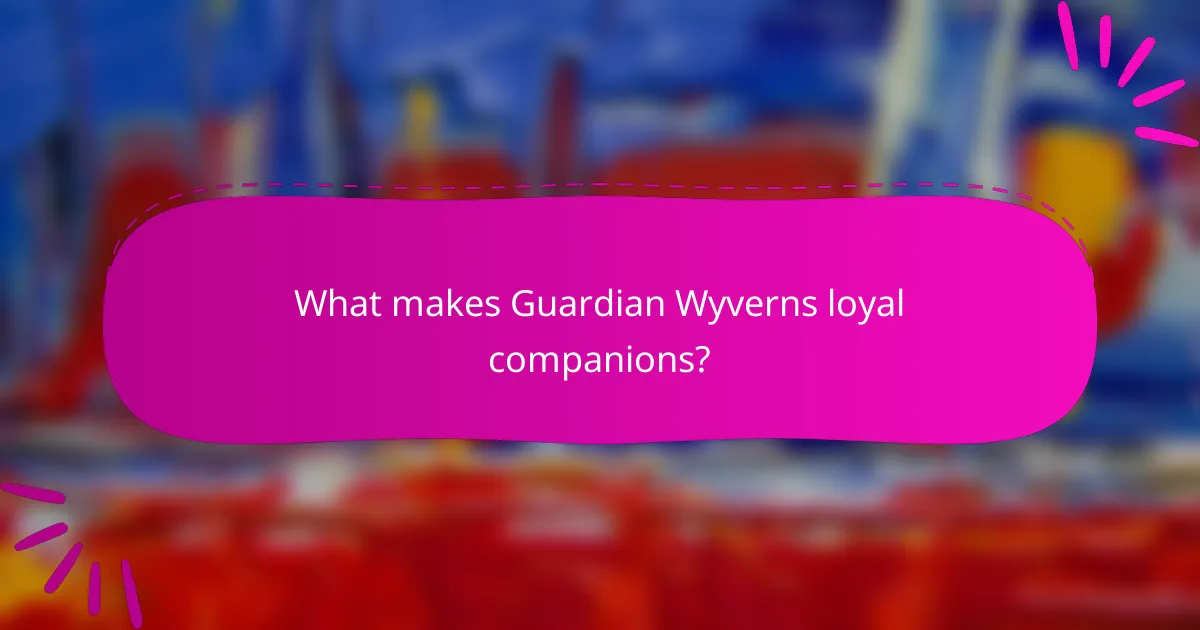
What makes Guardian Wyverns loyal companions?
Guardian Wyverns are known for their unwavering loyalty and strong bonds with their owners. This loyalty stems from their deep emotional connections and protective instincts, making them exceptional companions.
Strong attachment to owners
Guardian Wyverns develop a strong attachment to their owners through consistent interaction and care. They thrive on positive reinforcement and emotional engagement, which fosters a sense of security and belonging. This bond often leads to protective behaviors, as they see their owners as part of their pack.
To strengthen this attachment, owners should spend quality time with their wyverns, engaging in activities that promote trust and affection. Regular feeding, grooming, and playtime can significantly enhance the emotional connection.
Consistent companionship traits
Guardian Wyverns exhibit consistent companionship traits, including loyalty, protectiveness, and a desire for closeness. They are known to follow their owners closely, providing a sense of security and companionship. This behavior is rooted in their instinct to protect their territory and loved ones.
Additionally, these creatures often display empathy, responding to their owner’s emotions and moods. This responsiveness further solidifies the bond, making them not just pets but true companions.
Training methods for loyalty
Training Guardian Wyverns for loyalty involves establishing clear communication and positive reinforcement techniques. Owners should use rewards, such as treats or praise, to encourage desired behaviors. Consistency in commands and routines helps reinforce the bond and loyalty.
Incorporating socialization with other creatures and environments can also enhance their loyalty. Exposing them to various situations while ensuring their comfort can build confidence and strengthen their attachment to their owners.
Behavioral studies on loyalty
Behavioral studies indicate that loyalty in Guardian Wyverns is influenced by their upbringing and social interactions. Research shows that wyverns raised in nurturing environments tend to display higher loyalty levels compared to those with less socialization.
These studies highlight the importance of early training and consistent companionship in fostering loyalty. Understanding their behaviors and emotional needs can help owners create a supportive environment that encourages strong, loyal bonds.
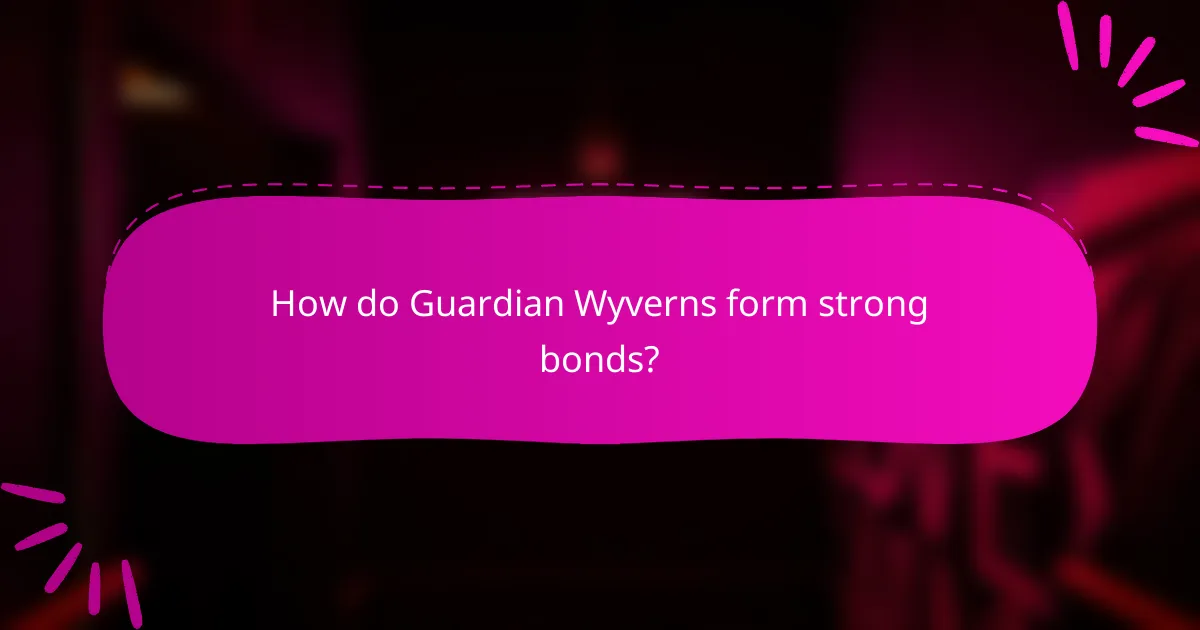
How do Guardian Wyverns form strong bonds?
Guardian Wyverns form strong bonds through consistent interaction and shared experiences with their owners. These connections are built over time, fostering loyalty and protective instincts that enhance the companionship between the wyvern and its human.
Shared experiences with owners
Shared experiences play a crucial role in the bond between Guardian Wyverns and their owners. Engaging in activities such as training sessions, exploration, and playtime helps establish trust and mutual understanding. Regularly spending quality time together can significantly strengthen this relationship.
For instance, taking a wyvern on outdoor adventures allows them to experience new environments, reinforcing their loyalty and attachment. The more varied and enriching the experiences, the deeper the bond tends to grow.
Socialization techniques
Effective socialization techniques are essential for developing a strong bond with a Guardian Wyvern. Early exposure to different people, animals, and environments helps them become well-adjusted and confident. Gradual introductions to new experiences can prevent fear and anxiety, promoting a sense of security.
Utilizing positive reinforcement during training sessions encourages desired behaviors and strengthens the bond. Simple commands, rewards, and praise can significantly enhance the wyvern’s responsiveness and attachment to their owner.
Impact of bonding on behavior
The bond formed between a Guardian Wyvern and its owner has a profound impact on the wyvern’s behavior. A strong connection often leads to increased loyalty, protective instincts, and a willingness to cooperate. Wyverns that feel secure in their relationships are more likely to exhibit calm and friendly behavior.
Conversely, a lack of bonding can result in anxiety, aggression, or withdrawal. Owners should be attentive to their wyvern’s emotional state and actively work to nurture the bond through consistent interaction and care.
Case studies of bonded Wyverns
Case studies illustrate the importance of bonding in Guardian Wyverns. For example, a wyvern named Zephyr developed exceptional loyalty after a year of shared training and outdoor activities with its owner. This bond enabled Zephyr to protect its owner during a potential threat, showcasing the depth of their connection.
Another case involved a wyvern named Ember, who thrived in a nurturing environment with regular socialization. Ember’s strong bond with its owner led to remarkable obedience and a calm demeanor, highlighting how effective bonding can positively influence behavior and companionship.

What are the best practices for caring for Guardian Wyverns?
Caring for Guardian Wyverns involves providing proper nutrition, ensuring adequate exercise, and facilitating social interactions. These practices help maintain their health and strengthen the bond between the wyvern and its caretaker.
Nutrition and health guidelines
Guardian Wyverns require a balanced diet rich in proteins, vitamins, and minerals. High-quality meats, supplemented with fruits and vegetables, should form the core of their meals. Aim for a daily intake that corresponds to their size, typically ranging from several kilograms of food per week.
Regular health check-ups are essential to monitor for common ailments. Vaccinations and parasite control should be part of their routine care, following guidelines set by local wildlife authorities.
Exercise and activity recommendations
Guardian Wyverns thrive on regular physical activity to maintain their strength and agility. Daily exercise sessions should include flying, climbing, and engaging in play. Aim for at least one hour of active time each day, allowing them to explore their environment safely.
Incorporating varied activities can prevent boredom and promote mental stimulation. Consider using toys or obstacles to encourage exploration and problem-solving during their exercise sessions.
Social interaction needs
Social interaction is crucial for the emotional well-being of Guardian Wyverns. They are naturally social creatures and benefit from regular interaction with their caretakers and other wyverns. Spend quality time with them daily to foster trust and companionship.
Group settings can enhance their social skills, so if possible, allow them to interact with other wyverns. Monitor their interactions to ensure they are positive and safe, as conflicts can arise without proper supervision.
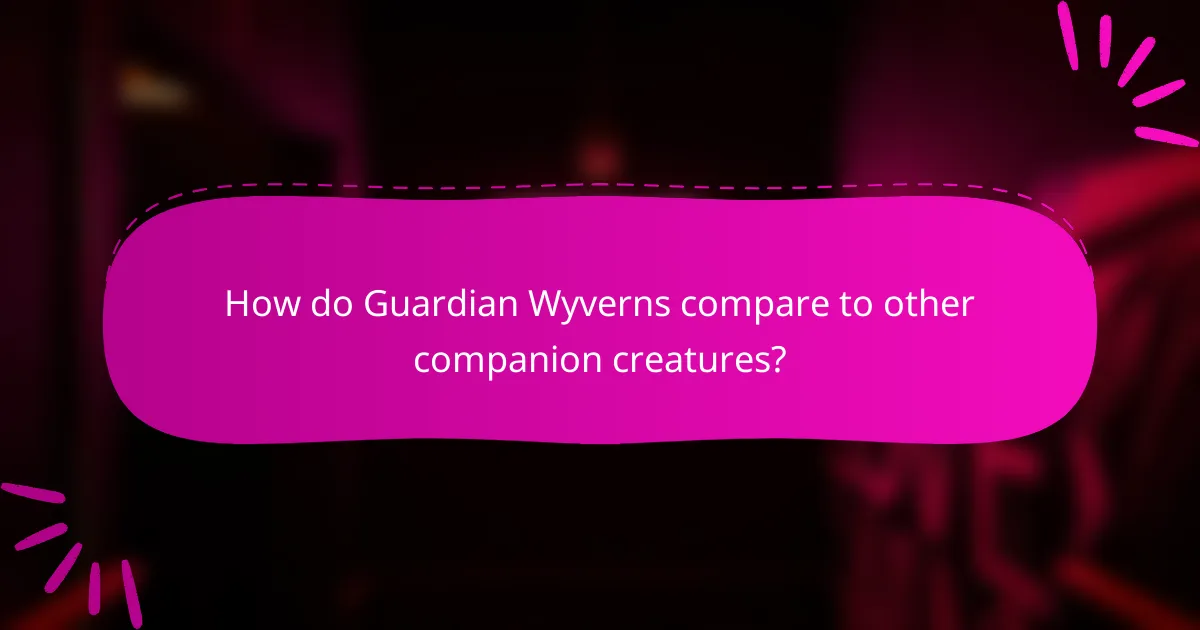
How do Guardian Wyverns compare to other companion creatures?
Guardian Wyverns stand out among companion creatures due to their unique combination of protective instincts, loyalty, and strong emotional bonds with their partners. Unlike many other companions, they offer both physical defense and deep companionship, making them invaluable allies in various situations.
Protective Moments
Guardian Wyverns are known for their remarkable protective abilities, often stepping in during critical moments to shield their companions from harm. Their keen instincts allow them to sense danger early, enabling them to react swiftly and effectively.
For instance, in a scenario where a companion is threatened, a Guardian Wyvern may interpose itself between the danger and its partner, using its size and strength to deter aggressors. This protective behavior is not just instinctual but also stems from the strong bond they share with their companions.
Loyal Companionship
The loyalty of Guardian Wyverns is unparalleled, often forming lifelong partnerships with their companions. This loyalty manifests in their unwavering support and dedication, making them reliable allies in both everyday life and challenging situations.
In practice, a Guardian Wyvern will often accompany its partner on various adventures, providing not only protection but also emotional support. Their loyalty can be seen in their willingness to face threats head-on, ensuring their companion’s safety above all else.
Strong Bonds
The bond between a Guardian Wyvern and its companion is built on trust, mutual respect, and shared experiences. These creatures thrive on interaction, and the more time spent together, the stronger the connection becomes.
To cultivate this bond, companions should engage in activities that foster trust, such as training sessions or shared adventures. Over time, this relationship deepens, resulting in a formidable partnership where both the wyvern and the companion understand each other’s needs and instincts.






